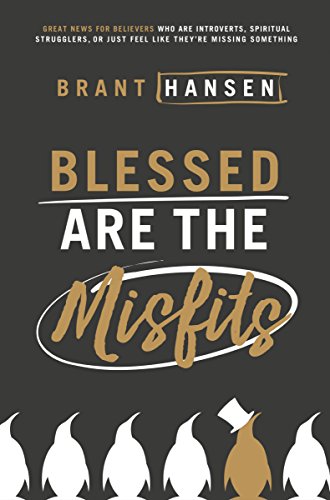Are you skeptical about God’s existence while people around you share amazing God-experiences of how they feel Him closely? Do you feel you are a nobody because you don’t have a specific role? Do you struggle with a wandering mind even while praying, but feel unspiritual to talk about it? Is talking to others not your thing? Are you in a never-ending struggle trying to figure out the church culture around you? And, do you have countless such questions? If the answer is ‘yes’, then “me too,” says Brant Hansen, the author of Blessed are the Misfits. Just as the name suggests, it is exclusively for the ones who feel like a misfit, trying to belong in the wrong place, trying to make sense of it.

Brant, being a person who was diagnosed with Asperger’s syndrome, and has a neurological condition called nystagmus is also an introvert, identifies himself as a misfit belonging to the soft-spoken world, yet very sceptic, honestly honest and straightforward. This is what makes the reader relate to him so much. His use of sarcasm to criticize the popular Christian culture—and Christians’ spiritual exaggeration—loaded with humour and wit at the right place, engages his readers right from the beginning.
Many times, loud spirituality makes the rest of us feel like we’re in the wrong place, wanting to run away from all that.
He shares his experience about living in this world around so many strange human beings with different personalities; his personal life, and being a part of CURE international hospital and how it reminds him of God’s love for everyone and how people can become a real agent of that. Being a sceptic himself, he questions the church culture and finds real answers to it.
Many times, loud spirituality makes the rest of us feel like we’re in the wrong place, wanting to run away from all that. But Brant assures that even with the feeling of insignificance and all the confusion we have, we are still known by God; we have a part in His plan. So, we can make up our mind to talk to people, pray even when our mind is wandering, love people even when they’re annoying, take a real decision to do what God wants us to do in spite of us feeling the opposite and the like.
Here are a few points I like to highlight from the book:
1. Praying. To some it comes naturally; for some it can be difficult because it’s hard to focus when the mind is wandering. So, the author tells us that God is interested in us opening up to Him in ways we can. And praying can help us in ways we never know. We all know we can be ourselves to Him, then why not do that! Not praying is worse than a jumbled prayer.
2. Talking to people. This is a common problem faced by an introverted person. It’s really hard. Also, as much as we like to be a private person, there are so many benefits when we decide to bridge the gap, such as: We find a change in our self-justification attitude; wisdom and correction from people who value God, a different perspective about God than ours, honest confessions and finally, the realization that other people need us and we need them—that way we become a blessing to each other. Likewise, we fulfil what God wants us to do and we definitely need a Christian community for that because we can’t do it alone. It’s a real struggle but there’s no substitute to that. And it is the right struggle.
We all know we can be ourselves to Him, then why not do that
3. Dealing with the inner voice that tells nothing but negative about self. We all suffer from thoughts like ‘nobody cares about what I do’; ‘I am no help to anyone’; ‘how is my word going to change anything’; ‘I am not good at interacting’, etc., and we live with this illusion. These might be the haunting thoughts from the past before knowing Jesus or because of something someone told us; or maybe we told ourselves over the years, but we can question these thoughts and rephrase it with truth. We must examine it in the light of the word. The truth is the opposite of those negative thoughts. And because of the truth we have hope. Yes, knowing that there is a bigger reality than what we feel gives hope.
4. Our feelings do not determine God’s proximity in our life. It’s independent of our good and bad days and the constant spiritual dryness we feel. Whether we acknowledge it or not He’s always present as He has always been; He is highly involved in our lives and loves us deeply. This truth will never change. We do belong to Him, and in His kingdom, there is a place not just for the ones who constantly feel His presence but also for those who do not; as Brant says, “We have accepted his proposal’’ when we first believed in Him. We’re included.
Now, this book is not about positive thinking or anything of that sort. It plainly states the problem of a Christian who is an introvert; a person who is yearning for more of God the entire life, not able to have the same spiritual experience as others, feeling left out and strange, like missing out on something important, wondering if it is their fault and so much more. That is why I can relate to this book. All of sudden I feel am not alone and there are people out there who feel the same. This book gave me a new perspective and showed me that “I can have what I want, but not yet’’. It is a must read for everyone who is tired of others’ spiritual exaggeration.






